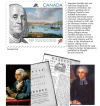Just started this book as it was recommended by Matthew Ehret - recommended by him on a video whereby he was discussing Benjamin Franklin, and not the Franklin many might know, it seems. Ehret held Lowry's book up in his video saying, it should be read. Okay, going to check it out as I want to know more about the history between nations and this man who I thought to know. For instance, had not known that Franklin had assisted in setting up a newspaper still in print today in Montreal, Quebec.
Some things don't seem to change in terms of the 'political' bold above.
Matthew also discusses more of what was going on with Franklin as read under the subheading (see above link) Getting to know the Real Benjamin Franklin:
First:

[article snip]
Had read this elsewhere in more detail, and yet here is a chance to read further on Franklin.
Back to Lowry, there is also an article discussing Lincoln by Lowry here, which is also, apparently, part of the book:
Chapter 10 of the book: Who Was Benjamin Franklin?
Here is a video on Lowry (who I'm only discovering):
There is also this:
In the above talk (and in the book as indexed), Lowry spends time discussing the British Hell-Fire Club (British War Sanctum), and what a bunch of degenerate crazies. He says "the state thrives on the corruption of its subjects". Yes, it seems so.
Lowry ends saying just how bad in got in England, that between 1738 - 1758, there were 297,000 births weighed against 486,000 deaths.
It is not on the top of the pile and will hopefully get a chance to read soon.
Montreal’s Gazette was founded by a French republican named Fleury Mesplat recruited by Franklin in order to help counteract the destructive effects the French feudal system had on the cognitive powers of the Quebec colonists whose rampant illiteracy dovetailed their non-existent appetites for representative government or freedom. In this feudal culture, blind obedience to authority (whether political or religious) was seen as preferable to thinking for oneself.
Some things don't seem to change in terms of the 'political' bold above.
Matthew also discusses more of what was going on with Franklin as read under the subheading (see above link) Getting to know the Real Benjamin Franklin:
First:

[article snip]
When it became clear that the British aristocracy was intent on crushing Franklin’s dreams of emancipation by the early 1770s, Franklin began devoting all of his energy towards a full revolution from the “mother country” and French Canada was always a high prize. Since British abuses of the French population ran rampant, and sympathy for the republican cause was widespread among Quebec subjects (though not the feudal elite), Franklin and others believed that Quebec’s eventual participation would not be a difficult affair.
By 1774, the British Empire pre-empted the inevitable participation by passing the Quebec Act giving an unprecedented array of religious freedoms to Quebec’s population which were always fearful of losing their Catholic traditions. These freedoms came however, at the cost of unquestioned loyalty to the Crown, and to accept never having representative government (only Crown appointees). The Jesuit-run clergy elite were overjoyed to keep their hold on the population, tithes and still enjoy revenue of the human cows on their lands. As an additional insurance, the Church under the control of Bishop Briand ensured that any subject who joined Washington’s rebellion would be excommunicated on the spot and thus burn in hellfire for eternity!
Had read this elsewhere in more detail, and yet here is a chance to read further on Franklin.
Back to Lowry, there is also an article discussing Lincoln by Lowry here, which is also, apparently, part of the book:
This article was put together and edited by Pam Lowry in 2003, following the death of her husband Graham Lowry, using an incomplete draft of an article, research notes, and the transcript of several classes Graham conducted on Lincoln during the year before his health failed him. Graham is the author of
How the Nation Was Won: America’s Untold Story, Volume I, 1630-1754 (1987).
Chapter 10 of the book: Who Was Benjamin Franklin?
Here is a video on Lowry (who I'm only discovering):
A Tribute to H. Graham Lowry (2003)
Aug 28, 2012
There is also this:
Graham Lowry's presentation from the "Palmerston's Zoo" panel-1994 Schiller Institute Conference
Venice Infects England by H. Graham Lowry
Sep 3, 2012
In the above talk (and in the book as indexed), Lowry spends time discussing the British Hell-Fire Club (British War Sanctum), and what a bunch of degenerate crazies. He says "the state thrives on the corruption of its subjects". Yes, it seems so.
Lowry ends saying just how bad in got in England, that between 1738 - 1758, there were 297,000 births weighed against 486,000 deaths.
It is not on the top of the pile and will hopefully get a chance to read soon.
